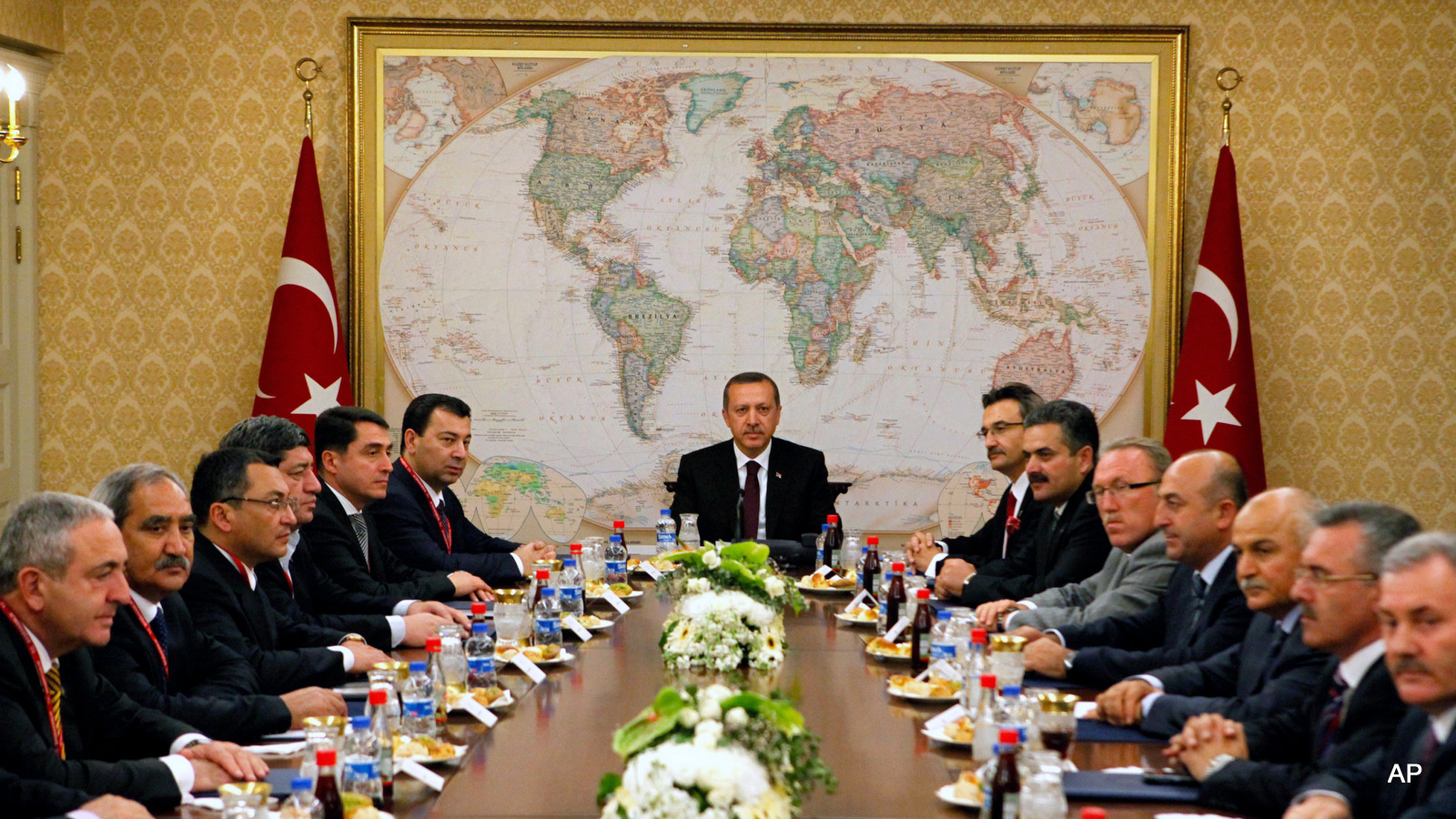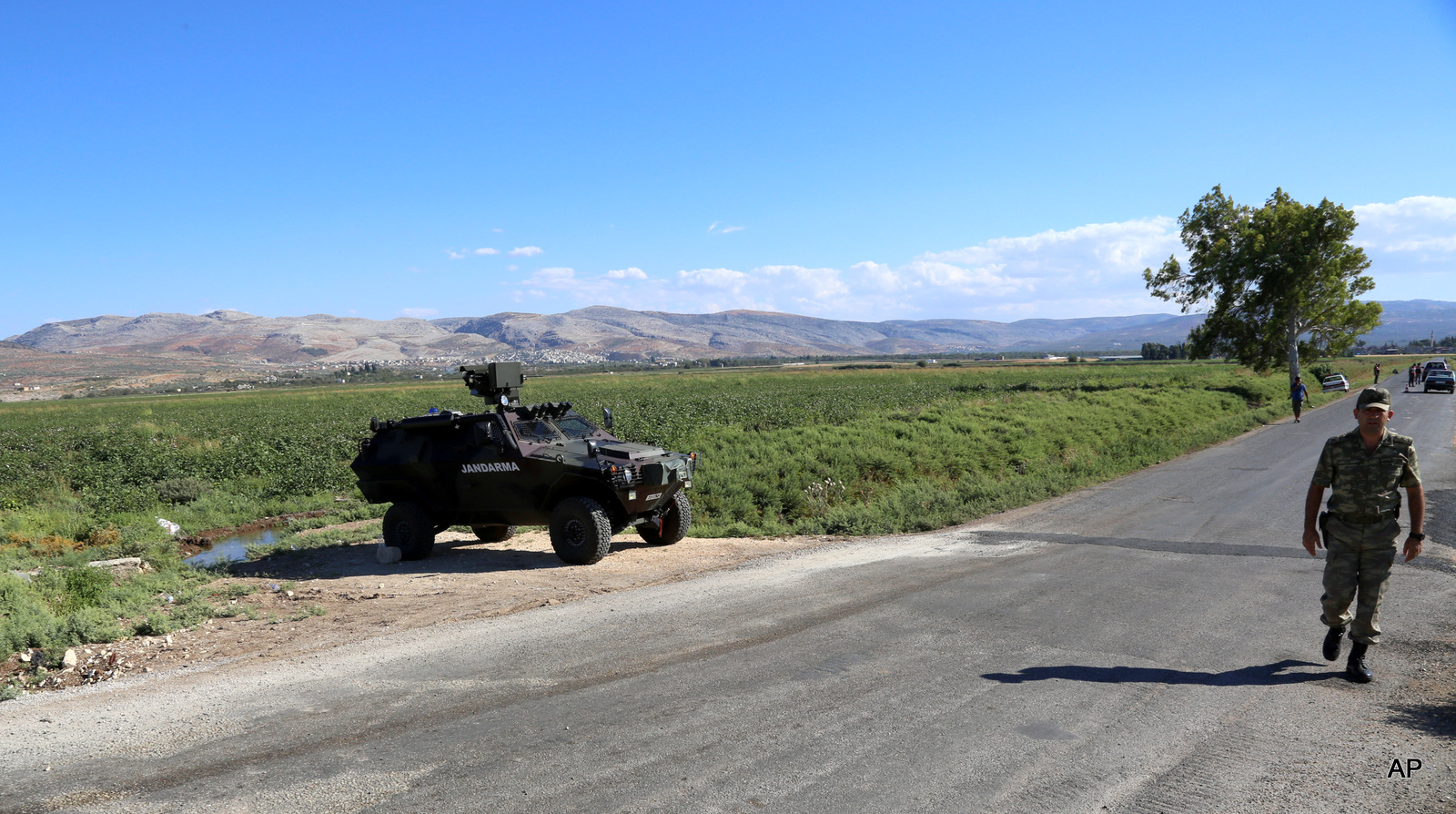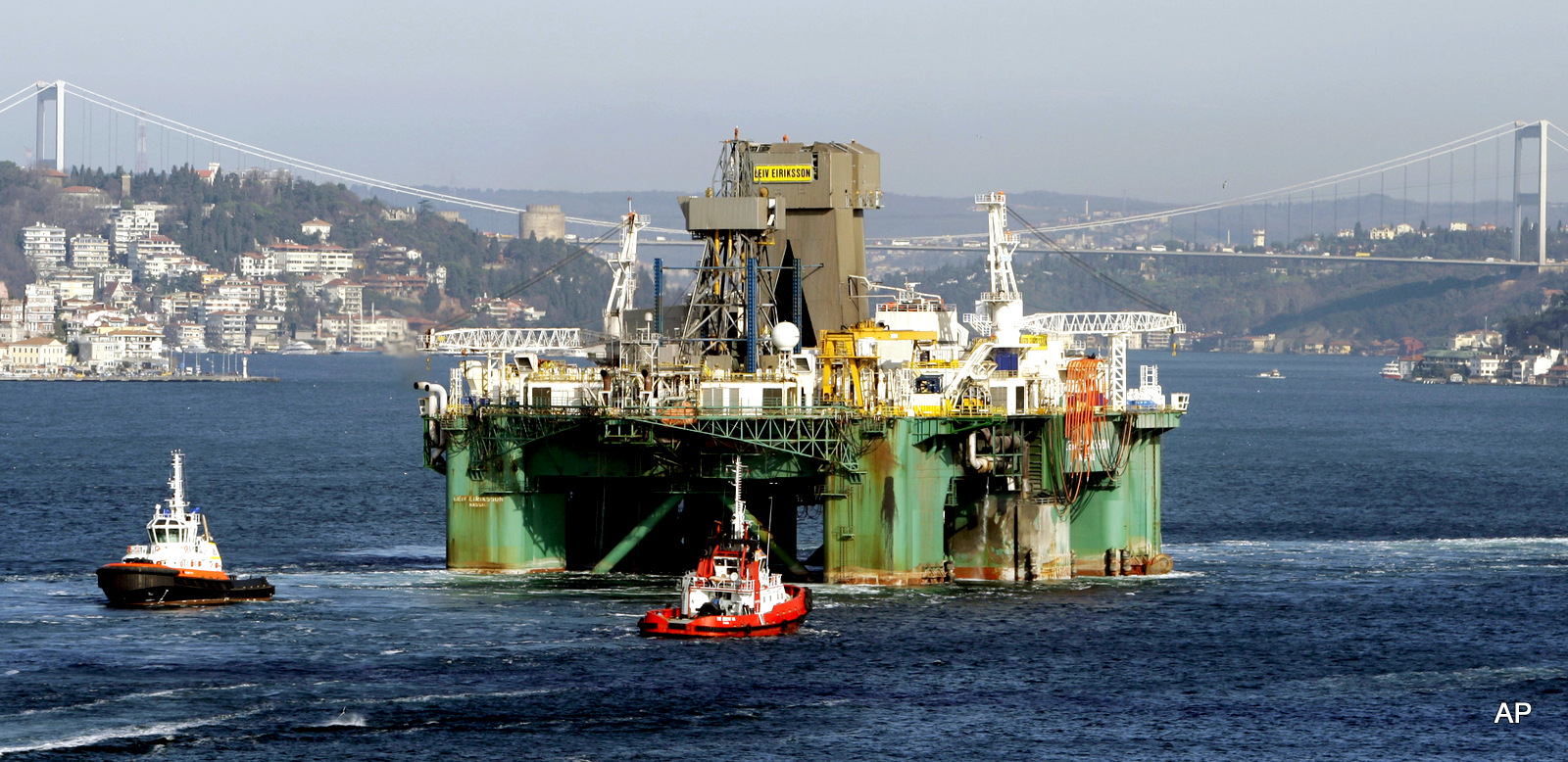 Turkey’s Prime Minister Tayyip Erdogan, center meets with lawmakers from Azerbaijan, left row, in Ankara, Turkey, Oct. 14, 2009 to stabilize the south Caucasus with its vulnerable energy. Turkey is quietly emerging as a global energy hegemon.
Turkey’s Prime Minister Tayyip Erdogan, center meets with lawmakers from Azerbaijan, left row, in Ankara, Turkey, Oct. 14, 2009 to stabilize the south Caucasus with its vulnerable energy. Turkey is quietly emerging as a global energy hegemon.
LONDON — Russia and the United States’ hegemonic ambitions were laid bare in March 2014 over the highly contentious Crimean crisis, both looking to outdo the other in a rivalry that’s persisted since at least the Second World War.
But this “cold war” which has been playing out over the decades has nothing to do with politics and everything to do with the energy race, according to Gulgiz Dadashova, an energy analyst for Edison Investment.
With the world on the brink of another world war over a fire lit in the Middle East, oil and gas — not ideology, religion or even nationalism — are at the very core of the equation of power and greed. Indeed, the priority for most nations is a pragmatic one: securing access to energy resources and controlling their flow.
Though the main players of this brutal game remain true to the old U.S. vs. Russia divide, Turkey is emerging as a natural contender, a kingmaker of sorts and a regional energy superpower in its own right. And while the old Ottoman Empire is no more, the core of what made it great remains relevant today: geography and vast natural resources.
Natural resources have become the holy grail of power, the sole generator and sustainer of true hegemony. Nations have risen and fallen over access and control of natural resources. Though unknown to many, Adolf Hitler’s Russian campaign was prompted not by an overarching and over-reaching belief that Nazi Germany should rule unchallenged over the European continent, but rather the understanding that without access to oil and gas the Third Reich would not last another winter. It was Azerbaijan’s vast natural resources which pushed Hitler to sign his empire’s death warrant — but, then again, he had no choice but to challenge the Russian Kraken.
As we know now, challenging Stalin’s Russia would ultimately lead to the fall of Berlin and with it the dissolution of Hitler’s brutal regime.
“As the Nazi war machine vanquished Poland, captured France, and as the Luftwaffe besieged Britain from the air in May 1940, Hitler recognized the palpable reality that his war machine was reliant on a finite quantity of natural resources, principally oil,” Dadashova told MintPress News.
“Hitler figured that if he captured the oil of the Caucuses, Germany’s New Order Order empire would be rendered self-sufficient within its own borders and, thus, invulnerable. But his strategy of fighting on two fronts — Stalingrad and the Caucuses — spread the German military’s resources too thin and proved disastrous. Eventually Hitler lost everything, for he attempted to gain everything.”
A modernday wannabe emperor, Hitler bet his throne on a game of oil roulette. But he would not be the last leader to put oil above flag and nation or disguise oil-grabbing policies under the pretenses of democracy-building, counter-terrorism, or nationalism, among many others.
“As powers continue to play the Great Game 2.0, natural resources sit at the heart of everything. Every negotiation, every war, every battle of words unfolding in the world, oil and gas have been the one common denominator. Everything else is pretty much fairy dust,” said Rufiz Hafizoglu, an energy expert with Azerbaijan’s Trend News Agency, to MintPress.
While Moscow and Washington play their game of thrones, Turkey has used geostrategy, historical ties and political common sense to weave a far-reaching, energy-based grand alliance. Yet Turkey never gave up on its ambitions of grandeur.
Energy security rhymes with national security
 Turkish soldiers patrol a road near Hacipasa, Hatay, Turkey. At the peak of Turkey’s oil smuggling boom, the main transit point was a dusty hamlet called Hacipasa on the Orontes River that marks the border with Syria, Saturday, Sept. 20, 2014. Hacipasa has been a smuggling haven for decades, authorities and residents say. The fuel had come from oil wells in Iraq or Syria controlled by militants, including the Islamic State group, and was sold to middle men who smuggled it across the Turkish-Syrian border.
Turkish soldiers patrol a road near Hacipasa, Hatay, Turkey. At the peak of Turkey’s oil smuggling boom, the main transit point was a dusty hamlet called Hacipasa on the Orontes River that marks the border with Syria, Saturday, Sept. 20, 2014. Hacipasa has been a smuggling haven for decades, authorities and residents say. The fuel had come from oil wells in Iraq or Syria controlled by militants, including the Islamic State group, and was sold to middle men who smuggled it across the Turkish-Syrian border.
While Russia and the U.S. have been designated the world’s superpowers due to the sheer size of their military and economic footprints, frictions and opposing agendas have led other forces to grow within the space of their disagreements. Turkey is one of the best examples of this.
Speaking with MintPress, Fazly Çorman, Turkey’s ambassador to Yemen, noted that his country had become “one of the fastest growing energy markets in the world in parallel to its economic growth over the past ten years.”
Çorman went on to explain that Turkey used a clever privatization program to hedge its vast natural resources and invest toward strategic energy development — all while also exploiting the country’s unique geography to broker alliances and energy agreements in view of increasing world powers’ dependence on Turkey.
“The country’s energy sector has a highly competitive structure and as such offers new horizons for growth, not just economically but politically, of course,” the ambassador said. “Turkey wants, of course, to become an active player on the international scene, especially since its position offers natural openings onto Europe, Asia, Africa and the Middle East.”
As stipulated by a 2012 energy strategy report from the Turkish foreign ministry, “Turkey is expected to become one of the most dynamic energy economies of the world in terms of increase in energy demand.”
And because its energy needs will increase alongside population growth and established industry growth requirements, Ankara officials have taken energy security very seriously indeed.
“The limits of Turkey’s domestic energy sources in light of its growing energy demand have resulted in dependency on energy imports, primarily of oil and gas,” the report continues. “At present, around 26% of the total energy demand is being met by domestic resources, while the rest is being provided from a diversified portfolio of imports.”
“The country’s primary goal is to realize its own energy security,” the report says, explaining that to achieve this, Turkey plans to diversify its energy supply routes and sources, increase the share of renewables in its energy mix, pursue nuclear energy, take significant steps to boost energy efficiency, and contribute to Europe’s energy security.
As Martin Katusa, Casey Research’s chief energy investment strategist, writes in his book “The Colder War,” countries “plan to win not through the sword, but through control of the world’s energy supplies.”
As it happens, Turkey stands to benefit from its geography and current tensions between the U.S., the European Union (EU) and Russia.
Turkey: The natural-born energy dealer
 The Leiv Eiriksson, one of the world’s largest rigs, makes its way crossing the Istanbul’s Bosporus Strait to the Black Sea, in Istanbul, Turkey, Thursday, Dec. 31, 2009.
The Leiv Eiriksson, one of the world’s largest rigs, makes its way crossing the Istanbul’s Bosporus Strait to the Black Sea, in Istanbul, Turkey, Thursday, Dec. 31, 2009.
Ambassador Çorman noted that energy has been a major part of Turkey’s diplomatic and political efforts in recent decades because Ankara understands that real, potent power comes with energy control, energy access and energy leveraging.
A bridge between continents, Turkey remains the cornerstone of Europe’s energy security, especially now that the EU and Russia are on less-than-friendly terms.
Energy-hungry and Russian-gas-dependent Europe has had to look for alternative means of satisfying its growing energy needs, especially when it comes to sources of cheap and reliable energy. And since its only logical alternative lies in the energy-rich South Caucasus region, Turkey benefits from a tremendous geostrategic advantage.
Dadashova, the energy expert based in Azerbaijan, believes the EU’s warming up to Turkey over the past year has much to do with ongoing talks with South Caucasian countries — Georgia, Azerbaijan, Turkmenistan, Kazakhstan and others — to join an energy deal through the Caspian Sea via Turkey.
“The Southern Gas Corridor was devised with Europe’s energy security in mind, and with developments in Crimea it is obvious the EU had to ease off pressure from Turkey and focus instead on brokering a secure deal. Just like the U.S. has always agreed to turn a blind eye to Saudi Arabia’s excesses against democracy and freedom, the EU is willing to look the other way on Ankara’s policy in the Middle east,” Dadashova noted.
“Pragmatism often trumps political sentimentality,” she continued. “There cannot be a safe Europe without Turkey, so the EU would rather work with Ankara than against it, especially since Turkey is already an established grand power in the region. We are not exactly talking about a pawn Western powers can move about as they wish here — not in the current regional climate anyway.”
Under the Southern Gas Corridor, Azerbaijan, Turkey, Georgia, Turkmenistan, Kazakhstan, Iraq, Egypt and Mashriq countries would provide Europe with safe and reliable gas.
“In addition to having a huge domestic market, Turkey is strategically located between major energy consumers and suppliers, thus serving as a regional energy hub. The existing and planned oil/gas pipelines, the critical Turkish straits and promising finds of hydrocarbon reserves in the country itself give Turkey increased leverage over energy prices and reinforce its gateway status,” reads a report from the Investment Support and Promotion Agency under Turkey’s prime ministry.
Speaking earlier this month at a European foreign ministers meeting in Budapest, Volkan Bozkir, Turkey’s European Affairs minister and chief negotiator, said:
“Standing at a crossroads between major energy producers and consumer markets, Turkey is not only an end market, but has also established itself as a reliable transit country, offering short, secure and sustainable route for the energy resources of its energy rich neighbourhood.”
Always pushing forward, Turkey inaugurated a pipeline groundbreaking ceremony on March 17 in Kars, Turkey. The 2,000-kilometer, $11 billion Trans Anatolian Gas Pipeline Project (TANAP) is a critical part of the Southern Gas Corridor, which will deliver gas from Azerbaijan to Europe, via Turkey. The pipeline is expected to be completed by 2018 and will carry 6 billion meters of natural gas to Turkey and an additional 10 billion cubic meters of gas to Europe by 2019.
The energy war
In his book “The Colder War,” Katusa explains in great detail the power oil and gas hold over nations and world politics. He writes, “It’s a commonplace that the world runs on energy, but few appreciate the mercilessness of that truth for an industrialized world. Putting it quite simply, energy is the sine qua non of civilization itself.”
Indeed, no matter how mighty and sophisticated, nations would eventually fall to ruins without energy. Their industries would be paralyzed, their state institutions suffocated by their inability to sustain the matrix upon which modern society has been weaved.
At the rate nations are burning through their energy sources, notwithstanding developments in the renewable energy sector, it’s a hunger that’s only set to grow.
“It’s true that technology is making rapid improvements in the efficiency of renewable or sustainable energy, mainly solar and wind, but in the foreseeable future there is no remotely practical substitute for the high-density energy of fossil fuels. Therefore, governments will continue to battle it out on the energy battlefield, looking for ways to establish domination through control or access of natural resources. This is the reality of the world we live in today,” explained Teshu Singh, a geopolitical analyst with Institute for Peace and Conflict Studies, to MintPress.
Within this equation of power it is easy to understand that for those nations or even companies which will successfully position themselves in the energy race, control will be the ultimate reward. Because those who do exert a monopoly on energy — whether reserves, delivery, sale or transportation — will by extension exercise tremendous influence over government, economies and people.
“This is the real war no one talks about,” Singh stressed.
Examples of this “secret war” are not hard to find if one cares to look past false pretenses and political melodramas. The U.S. has waged a global war in the Middle East for the past decade in view of securing access to the region’s vast natural resources.
In a March 2005 report for the BBC, Greg Palast, a bestselling author and investigative journalist for the BBC and The Guardian, clearly defined then-U.S. President George W. Bush’s 2003 military intervention in Iraq as a ploy to exert control over the country’s immense oil and gas reserves.
Palast wrote, “The Bush administration made plans for war and for Iraq’s oil before the 9/11 attacks, sparking a policy battle between neo-cons and Big Oil.” He continued, explaining how in partnership with the U.K., American “Big Oil” moved to grab Iraq’s oil fields by using “democracy building” as a cover for the media.
“Mr Aljibury [Falah Aljibury, an Iraqi-born oil industry consultant], once Ronald Reagan’s ‘back-channel’ to Saddam, claims that plans to sell off Iraq’s oil, pushed by the US-installed Governing Council in 2003, helped instigate the insurgency and attacks on U.S. and British occupying forces.”
Although powers have been careful to disguise their energy agendas, rationalizing their ever increasing aggressive stance toward energy hegemony under false premises, it’s apparent that oil and gas remain at the core of many territorial, political and even religious disputes.
Looking at how the U.S. and the EU have risen against Russia since the Crimean crisis, Turkey is bound to play an important role in this circle of power. And bearing in mind how important Turkey stands to become against Russia and to Europe in terms of its energy wielding capability, Ankara’s shadow is likely to stretch further and wider over the coming decade, assuming of course Russia does not foil such a plan.

